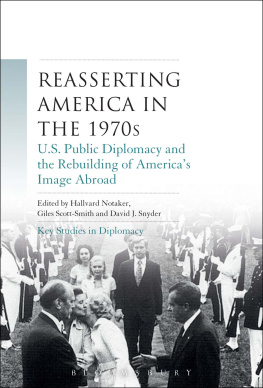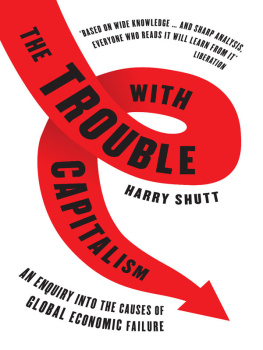The 1970s

AMERICA IN THE WORLD
SVEN BECKERT AND JEREMI SURI, series editors
David Ekbladh, The Great American Mission:
Modernization and the Construction of an American World Order
Martin Klimke, The Other Alliance: Student Protest in West Germany
and the United States in the Global Sixties
Amdrew Zimmerman, Alabama in Africa: Booker T. Washington,
the German Empire, and the Globalization of the New South
Ian Tyrrell, Reforming the World:
The Creation of Americas Moral Empire
Rachel St. John, Line in the Sand:
A History of the Western U.S.Mexico Border
The 1970s
A NEW GLOBAL HISTORY
FROM CIVIL RIGHTS
TO ECONOMIC INEQUALITY
Thomas Borstelmann

Copyright 2012 by Thomas Borstelmann
Published by Princeton University Press, 41 William Street,
Princeton, New Jersey 08540
In the United Kingdom: Princeton University Press,
6 Oxford Street, Woodstock, Oxfordshire OX20 1TW
press.princeton.edu
All Rights Reserved
Library of Congress Cataloging-in-Publication Data
Borstelmann, Thomas.
The 1970s : a new global history from civil rights to
economic inequality / Thomas Borstelmann.
p. cm. (America in the world)
Includes bibliographical references and index.
ISBN 978-0-691-14156-5 (hardcover : alk. paper)
1. United StatesHistory1969 2. United StatesSocial
conditions19601980. 3. United StatesPolitics and
government19691974. 4. United StatesPolitics and
government19741977. 5. United StatesPolitics and
government19771981. 6. United StatesEconomic
conditions19711981. 7. United StatesForeign
relations19451989. 8. United StatesCommerce
History20th century. 9. EqualityUnited StatesHistory
20th century. 10. Nineteen seventies. I. Title.
II. Title: Nineteen seventies.
E839.B59 2012
909.827dc22 2011007790
British Library Cataloging-in-Publication Data is available
This book has been composed in Sabon
Printed on acid-free paper.
Printed in the United States of America
10 9 8 7 6 5 4 3 2 1
For my brother John,
foundation and best friend of my 1970s
This is the growing complication of the modern condition, the expanding circle of moral sympathy. Not only distant peoples are our brothers and sisters, but foxes too, and laboratory mice, and now the fish.
Ian McEwan, Saturday
The market gives people what the people want instead of what other people think they ought to want. At the bottom of many criticisms of the market economy is really lack of belief in freedom itself.
Milton Friedman, The New Liberals Creed
Heres where the concept of neoliberalismthe idea of the free market as the essential mechanism of social justiceis genuinely clarifying. A society free not only of racism but of sexism and of heterosexism is a neoliberal utopia where all the irrelevant grounds for inequality (your identity) have been eliminated and whatever inequalities are left are therefore legitimated.
Walter Benn Michaels, The Trouble with Diversity
CONTENTS
CHAPTER 1
Crosscurrents of Crisis in 1970s America
CHAPTER 2
The Rising Tide of Equality and Democratic Reform
CHAPTER 3
The Spread of Market Values
CHAPTER 4
The Retreat of Empires and the Global Advance of the Market
CHAPTER 5
Resistance to the New Hyper-Individualism
CHAPTER 6
More and Less Equal since the 1970s
ILLUSTRATIONS
PREFACE AND ACKNOWLEDGMENTS
WE ALL HAVE OUR HISTORIES. Most of mine was shaped in the 1970s. I turned twelve years old in 1970 and twenty-two in 1980. In between, I played a lot of basketball, fell in love with literature, left home, had my first jobs and girlfriends, spent time hitchhiking, and graduated from high school and college. I grew up. And coming of age in the 1970s did not mean just surviving orange shag rugs, polyester clothing, inflation, and national uncertainty. For me, it also included watching powerful people have their corruption exposed, learning to love the outdoors, taking spiritual searching seriously, and imbibing the struggle of half the people I knewwomenfor equality and respect. This was liberating and exhilarating, and I learned to be political: to try to keep my eye on power, to see who had it and how they used it, who benefited and who did not. While some people in the Me Decade turned away from the sphere of public life and politics, I was fascinated by it.
We all have geographies, too. Mine was fairly expansive in this decade, split roughly in thirds between the South, New England, and the West. An extended stay in Italy and visits to Mexico, Greece, the United Kingdom, and, a few years later, China widened my perspective. Along the way, I was blessed with enduring friendships that inevitably colored the 1970s with a positive hue. I was fortunate to live in two of the most beautiful places on earthFlorence, Italy, and Fallen Leaf Lake, California. I was, in the words of Canadian songwriter Bruce Cock-burn, cut by the beauty of jagged mountains and have never completely recovered from the wound. My Seventies involved a lot of extremely good fortune and stumbling into majesty and love and grace. It made me grateful.
I have been thinking about this era for thirty years, and I have had a lot of help along the way, from family in particular. My oldest brother, John JB Borstelmann, taught me the most at the time and has laughed with me the most ever since, as we have examined and reexamined our intersecting paths through that decade. My older brother, Michael Borstelmann, was, as our father put it, countercultural before the counterculture, modeling a gentler and kinder manner than almost anyone I knew. He helped me more than he may ever imagine. My older sister, Nancy Chandler, provided encouragement and a robust example of independent, back-to-the-land living. My parents, Jane and Lloyd Borstelmann, gone on now and much missed, gave us a home that was lively, literate, tolerant, and generous. They were the ground of my 1970s and my work as a historian. My wife, Lynn Borstelmann, is my same age, and though we did not meet until 1986, she took a roughly parallel path through the Seventies and we have compared notes now for twenty-five years. Indeed, we may even have crossed paths, unawares, somewhere in the second half of the decade, along the campuses or byways of Durham, North Carolina, my hometown and her college town.
Several readers made this a better book, rescuing me from a slew of embarrassing errors and forcing me to reconsider several issues. They will recognize their handiwork in the best parts that follow. For any faults in the book they bear no responsibility, since those faults mark precisely where I bullheadedly chose not to follow their advice. JB Borstelmann and Elaine Tyler May combed the manuscript with a degree of care that was extraordinarily generous, and each nurtured the project with enthusiasm and penetrating intelligence. Tom Bender and an anonymous reader for Princeton University Press provided unusually helpful and insightful feedback. Suzanne Mettler cheered for the book from the beginning and shared the wisdom of a political scientist in improving it. Andrew Preston offered a kindly endorsement and detailed suggestions, as did Steve Willborn. David Painter threw me a life ring on oil. Daniel Sargent, Jeffrey Engel, Ken Osgood, and Lew Erenberg invited me to present aspects of the book to audiences at, respectively, Harvard University, Texas A&M University, Florida Atlantic University, and Loyola University of Chicago, where I received thoughtful and challenging responses. My able agent, Lisa Adams of the Garamond Agency, helped place the book at Princeton University Press, where Brigitta van Rheinberg, Sarah Wolf, and the rest of the staff upheld their reputation for professionalism and efficiency. Copyeditor Karen Verde rescued me from several mistakes. The University of Nebraska provided crucial financial support. For their concern for the author and the completion of the book, I am grateful to Suzanne Mettler, Daniel and Elizabeth Nelson, and those with whom I live, my wife Lynn and our sons Danny and John.
Next page







